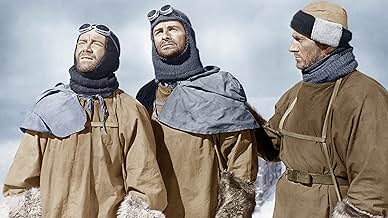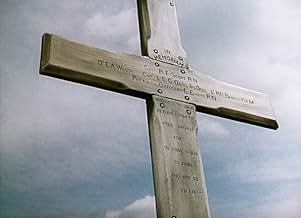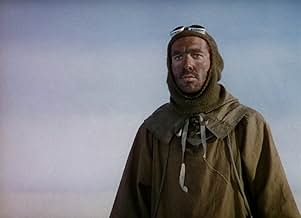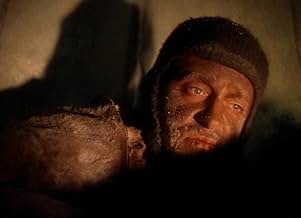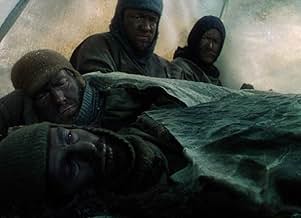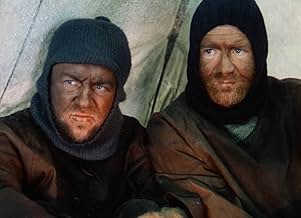IMDb-BEWERTUNG
7,0/10
2642
IHRE BEWERTUNG
Film um die Expedition des Entdeckers Robert Falcon Scott, der 1912 versucht, als Erster den Südpol zu erreichen.Film um die Expedition des Entdeckers Robert Falcon Scott, der 1912 versucht, als Erster den Südpol zu erreichen.Film um die Expedition des Entdeckers Robert Falcon Scott, der 1912 versucht, als Erster den Südpol zu erreichen.
- Regie
- Drehbuch
- Hauptbesetzung
- Nominiert für 1 BAFTA Award
- 1 Gewinn & 2 Nominierungen insgesamt
James McKechnie
- Surgeon Lt. E.L.Atkinson R.N.
- (as James Mc Kechnie)
Empfohlene Bewertungen
There have recently been a lot of dramatised and documentary programmes on UK terrestrial and satellite TV on the pioneering polar explorers, erstwhile rivals and colleagues Scott & Shackleton so I was keen to view this British made dramatisation of the former's doomed 1912 expedition to the South Pole. I was not disappointed. It is obviously difficult to maintain cinematic excitement for the viewer of what is basically a long march (a similar problem as in "The Spirit of St Louis" and "The Old Man & the Sea"), but the true to life tragedy here proves compelling in the end. Jack Cardiff's colour photography is splendid and I was surprised to observe so few "process" shots for a film from the 1940s, given the scale of the task here. John Mills is excellent in the key role of Commander Scott but the supports are all excellent, many of them chosen for their physical similarity to their real life counterparts - Mills too bears a more than passing likeness of physiognomy to Scott. In the post - war climate, Britain obviously sought comfort and inspiration from past heroes as the country rebuilt itself in economic austerity and Scott must have been an ideal model for glorification. Regardless of sniping comments from historians about Scott's poor planning, the film quite rightly avoids judgements and asks the viewer to recognise and admire the human heroism of these gallant men. There is surely no more tragic sacrifice in all exploration than Oates' "I'm going outside, I may be gone some time" - exit and the movie captures this moment with the necessary pathos, later repeating the sensitivity as Scott and his last two colleagues expire with the so near and yet so far "11 miles" on their freezing lips. The Vaughan-Williams music is suitably sweeping and elegiac. One wonders why Hollywood ignored the film at the Academy Awards of 1948, certainly the acting, cinematography and music, to name but three, were worthy of recognition. I wonder if anyone would remake it in the modern era as we approach the centenary of the triumph and tragedy of Scott's expedition. Are you listening Peter Jackson...?
There is a general feeling, already noted here, that this film whitewashes Scott and turns him into a heroic figure. This is not surprising when you consider that when it was being made survivors of the expedition and relatives of those who died (particularly Kathleen Scott) were still alive.
Nevertheless, the film does raise some questions about Scott's leadership and judgement: his desperation to be first at the Pole with inadequate planning and resources; his last-minute decision to take a fifth man to the Pole when supplies had been calculated for a four-man team; the fact that none of these questionable decisions are challenged by subordinates bound by Royal Navy discipline.
The scenes at the Pole are particularly telling. When the British reach the Norwegian camp it is Wilson who enters their tent, while Scott tells Bowers to "check the position". Wilson's look of disgust emphasises Scott's refusal to face hard reality at a critical moment.
So, yes, this is the story of a "national hero", but watch it with care and it is far from uncritical.
Nevertheless, the film does raise some questions about Scott's leadership and judgement: his desperation to be first at the Pole with inadequate planning and resources; his last-minute decision to take a fifth man to the Pole when supplies had been calculated for a four-man team; the fact that none of these questionable decisions are challenged by subordinates bound by Royal Navy discipline.
The scenes at the Pole are particularly telling. When the British reach the Norwegian camp it is Wilson who enters their tent, while Scott tells Bowers to "check the position". Wilson's look of disgust emphasises Scott's refusal to face hard reality at a critical moment.
So, yes, this is the story of a "national hero", but watch it with care and it is far from uncritical.
OK, we've heard a lot about the "real" history and the debate over whether Scott was a hero or a complete imbecile. Whatever the truth is and whatever revisionist or hagiography history is being peddled, "Scott Of The Antarctic" is a beautifully made film: One of the best looking early colour films which evokes a bye-gone era and is strangely compelling and haunting at the same time. The music by Vaughn-Williams, the greatest British classical composer of his time, is powerful and, again, haunting. In some scenes, they've recreated exactly some of the photos taken during the Scott expedition. The casting is spot on; look at the original photos and Millsy is uncannily like Scott, Kenneth More is Teddy Evans, Reginald Beckwith and James Robertson Justice do their real counterparts well and John Gregson, in one of his first film roles, captures Tom Crean perfectly (compare his performance with Paul McGann's Crean in "Shackleton", which was pretty good). Many film critics feel that "Scott of the Antarctic" was somewhat robbed at the 1949 Oscars.
Produced by Ealing Studios, Scott of the Antarctic is a stiff upper- lipped depiction of Captain Scott's infamous, ill-fated expedition to the South Pole. Facing freezing storms, starvation, lack of fuel, and having just digested the sobering revelation that Norwegian rival Roald Amundsen had beaten them too it, Scott and his remaining team of four settled and died just 11 miles from camp, where food, warmth and undoubtedly survival awaited them. Trading very much on the legend of Captain Scott, the film charms thanks to it's post-WWII optimism and gorgeous colour cinematography.
Beginning with a determined Scott, played heartily by John Mills, rounding up his crew, the film takes it's time to get to the Arctic. Relying on Captain Scott's beautifully written diary for its source of information, the film feels more documentary than straight feature. It is all the more detailed and authentic for it, but it comes at the expense of any real character development. By the time the credits roll, we know little more about Scott than when we started, apart from that he was obviously a determined and courageous man. But it makes up for this neglect with a startling final third, where director Charles Frend puts us through every step of Scott's exhausting final thrust to get back to civilisation.
Mills and the supporting cast (James Robertson Justice, Kenneth More, Harold Warrender et al) are excellent throughout, starting out as eager and boisterous, and later, as the last survivors wait to die in the tent that would become their tomb, withdrawn and contemplative. The setting plays as the main villain, and it's captured as both a place of isolated beauty and uninhabitable terror , thanks to Jack Cardiff's stunning cinematography, and it's the encroaching sense of doom that gives Scott of the Antarctic a raw power. Although it obviously ends badly, Scott's death proved to be the making of him. Amundsen was (somewhat cruelly) dismissed as a bad sportsman, and Scott was instantly labelled a hero for daring to stare such overwhelming odds in the face and hold his head high. For a country still recovering from the ravishes of war at the time of the film's release, it must have been a powerful sentiment indeed. One of Ealing's most overlooked efforts.
www.the-wrath-of-blog.blogspot.com
Beginning with a determined Scott, played heartily by John Mills, rounding up his crew, the film takes it's time to get to the Arctic. Relying on Captain Scott's beautifully written diary for its source of information, the film feels more documentary than straight feature. It is all the more detailed and authentic for it, but it comes at the expense of any real character development. By the time the credits roll, we know little more about Scott than when we started, apart from that he was obviously a determined and courageous man. But it makes up for this neglect with a startling final third, where director Charles Frend puts us through every step of Scott's exhausting final thrust to get back to civilisation.
Mills and the supporting cast (James Robertson Justice, Kenneth More, Harold Warrender et al) are excellent throughout, starting out as eager and boisterous, and later, as the last survivors wait to die in the tent that would become their tomb, withdrawn and contemplative. The setting plays as the main villain, and it's captured as both a place of isolated beauty and uninhabitable terror , thanks to Jack Cardiff's stunning cinematography, and it's the encroaching sense of doom that gives Scott of the Antarctic a raw power. Although it obviously ends badly, Scott's death proved to be the making of him. Amundsen was (somewhat cruelly) dismissed as a bad sportsman, and Scott was instantly labelled a hero for daring to stare such overwhelming odds in the face and hold his head high. For a country still recovering from the ravishes of war at the time of the film's release, it must have been a powerful sentiment indeed. One of Ealing's most overlooked efforts.
www.the-wrath-of-blog.blogspot.com
This was a terrific film. I first saw this movie in the summer in Atlanta when it was near 100 degrees and our air cond was not blowing very cold. Scenes in this film actually made me feel cold. I felt as though I had been on a journey to The South pole after this one. The final 45 minutes of this film are a gripping adventure, and does it without todays special effects.
Wusstest du schon
- WissenswertesThe hut where Scott and his party stay throughout the winter months before their final push to the South Pole still exists today, and is a tourist attraction for those few who travel down to that part of the world. The intensely cold, dry air has preserved everything almost exactly as it was a century ago.
- PatzerNo one's breath is ever visible in the Antarctic.
- Zitate
Capt. L.E.G. Oates: I'm just going outside; I may be away some time.
[as he leaves tent for certain death]
- Crazy CreditsRalph Vaughan Williams, then revered as Britain's greatest living composer, has an official credit consisting only of his surname, 'Vaughan Williams'.
- VerbindungenFeatured in Antarctica (1991)
- SoundtracksWill Ye No Come Back Again?
(uncredited)
Traditional Scottish tune, and lyrics by Lady Carolina Nairne (as Carolina Oliphant, Lady Nairne)
Heard as the ship leaves New Zealand
Top-Auswahl
Melde dich zum Bewerten an und greife auf die Watchlist für personalisierte Empfehlungen zu.
- How long is Scott of the Antarctic?Powered by Alexa
Details
Box Office
- Budget
- 2.370.000 £ (geschätzt)
- Laufzeit1 Stunde 51 Minuten
- Seitenverhältnis
- 1.37 : 1
Zu dieser Seite beitragen
Bearbeitung vorschlagen oder fehlenden Inhalt hinzufügen

Oberste Lücke
By what name was Scotts letzte Fahrt (1948) officially released in India in English?
Antwort
